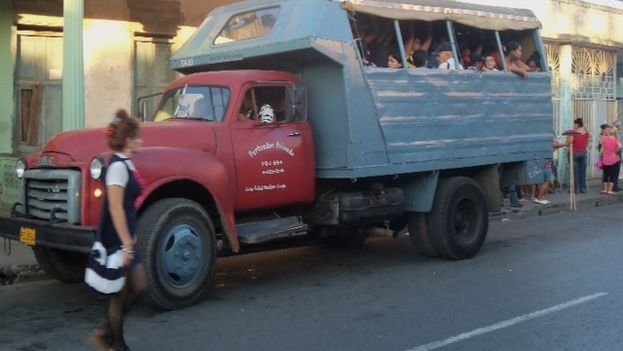
14ymedio, Eliecer Avila, 16 December 2014 — The end-of-year all over the world presents a challenge for many enterprises and businesses, especially for those in the transportation sector. Nobody wants to miss the opportunity to considerably increase the profits to be made from an extraordinary rise in demand for services. To this end, strategies are plotted and necessary adjustments are made well in advance. It is also true that at this time there is a surge in ticket prices. What would be strange is if, assuming you have the resources to travel, you were unable to find any means to get to your destination by land, sea or air.
That is, unless you live in Cuba. This is an island whose land and total population are comparable to or exceeded by some large cities of the world.
Over here, starting in the first few days of December, you can already hear in any office that sells tickets to travelers the famous phrase, “No, Son, no, for those dates, everything is sold-out
It is also common to find someone who laughs and says, ironically, “But who in their right mind thinks they can wait till early December to start shopping for tickets? That’s something you start doing at least three months in advance!”
The problem is that if you don’t find an option to travel by plane, train or bus, then you have to take a “suck it up and endure the consequences.” This means that you have to go outside Havana to get on some ancient American truck that’s more than 50 years old (that’s been jerry-rigged for such long hauls), and deal with a unlicensed driver and zero guarantees for passengers’ safety.
Even so, the price to board these hulking masses of steel exceeds 200 pesos. Thousands of people of all ages, including babes in arms, travel to and from the eastern end of the country seated on long iron benches, holding on by the tippy-tips of their fingers, and tossed from their spot every time the vehicle brakes or makes some sudden move to get ahead, or to avoid colliding with cars that are travelling in the opposite direction at hundreds of miles per hour, where there are no paved roads.
Rain, cold, hunger, darkness, the need to answer calls of nature (which, when you can do it, you might do it on the grass): these are among the benefits of this type of travel that can last, depending on the destination province, between 12 and 20 hours – if there are no breakdowns.
These people are the ones you later see on the news, reported injured or deceased in the accidents that take place daily on these routes. Of course, those reports don’t dig at the root of the problem, but rather lay all blame on the drivers of these contraptions.
A serious reflection on this subject – or on any other aspect of the daily life of Cubans – brings us to the inevitable conclusion that without a new political system, we will never climb out of this underdevelopment, which is perilously covered-up by our own selves.
I pray once again, at this end-of-year, that the backwardness, ignorance and above all the irresponsibility of the State does not cause the loss of life for so many Cubans on our roads. Unfortunately, the statistics are stacked against me.
Translated by: Alicia Barraqué Ellison
